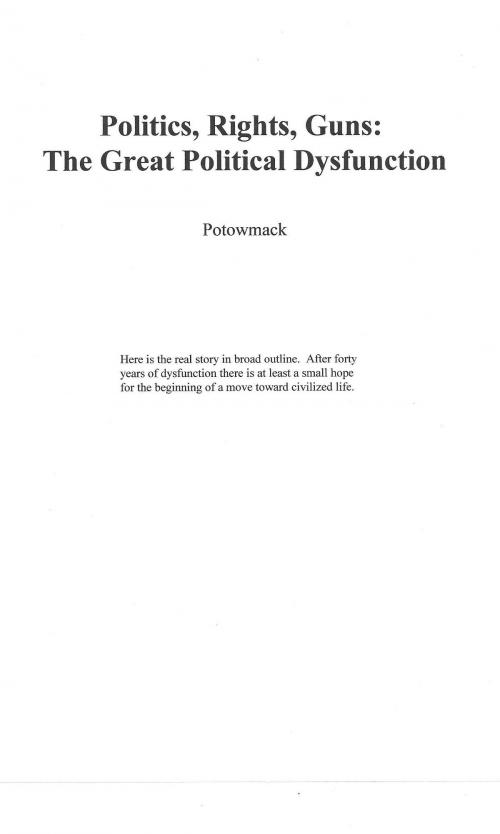Politics, Rights, Guns
The Great Political Dysfunction
Nonfiction, Social & Cultural Studies, Political Science, Government| Author: | Potowmack | ISBN: | 9781623095901 |
| Publisher: | BookBaby | Publication: | August 1, 2012 |
| Imprint: | Language: | English |
| Author: | Potowmack |
| ISBN: | 9781623095901 |
| Publisher: | BookBaby |
| Publication: | August 1, 2012 |
| Imprint: | |
| Language: | English |
In all the cascade of news reporting and comment on the tragic event in Aurora, Co., no one has observed that the Parker court (2007) concluded that we can have “registration ... for militia service if called up.” There is no contradiction of that in the Supreme Court rulings. Registration is the only way guns can be effectively regulated. That is where policy making begins. Registration, that is, accountability to a governing authority, accountability to the very legitimacy of a governing authority, is the one point of policy the gun lobby’s childish political fantasy cannot accommodate and what the NRA works hardest to defeat. That childish political fantasy is that the purpose of all those gun in private hands, outside of accountability to a governing authority is to maintain the “armed populace at large,” a collection of sovereign individuals who made a treaty based on no more than word of honor and promise of good faith and not a government which in the words of Alexander Hamilton in the Federalist Papers was about “POLITICAL POWER AND SUPREMACY” (caps in original). Militia call up resurrects the original civic purposes of military obligation and military preparedness. Militia duty in the colonies, the early Republic, the Constitution, the Second Amendment and the Militia Act of 1792 was conscript duty. The Militia Act required gun ownership, required militia officers to maintain inventories of privately owned weapons and report them to the state governors and the president of the United States. The original state based military obligation became national in the twentieth century selective service acts. All that is missing in the midst of national tragedies is long-overdue political leadership. That can start in the 2012 election season. This treatise makes a simple provocative proposal. When we lose our moorings and purposes the consequences are devastating. We have a crisis not only of gun violence mostly in the cities and of sovereignty on the Southwest border but in our political purpose. Gun rights ideologies cannot be limited to simply anti-government posturing. They are part of a much broader political and intellectual movement, which is called here the “Libertarian Right” that has very cynically never accepted the expansion of a governing authority, particularly, the authority of the Federal Government to make the twentieth century social contract. This movement does not accept that the United States in the twentieth century became a modern nation state and national community with national interests which required an expansion of a national governing authority. We start with the proposition that the Constitution is a frame of government not a treaty among sovereign individuals. The consent to be governed has serious implications for private gun ownership. We can argue the contours of the modern state policy by policy what we cannot do is throw out constitutional state baby with the modern state bath water. Fortunately the courts have not done that.
In all the cascade of news reporting and comment on the tragic event in Aurora, Co., no one has observed that the Parker court (2007) concluded that we can have “registration ... for militia service if called up.” There is no contradiction of that in the Supreme Court rulings. Registration is the only way guns can be effectively regulated. That is where policy making begins. Registration, that is, accountability to a governing authority, accountability to the very legitimacy of a governing authority, is the one point of policy the gun lobby’s childish political fantasy cannot accommodate and what the NRA works hardest to defeat. That childish political fantasy is that the purpose of all those gun in private hands, outside of accountability to a governing authority is to maintain the “armed populace at large,” a collection of sovereign individuals who made a treaty based on no more than word of honor and promise of good faith and not a government which in the words of Alexander Hamilton in the Federalist Papers was about “POLITICAL POWER AND SUPREMACY” (caps in original). Militia call up resurrects the original civic purposes of military obligation and military preparedness. Militia duty in the colonies, the early Republic, the Constitution, the Second Amendment and the Militia Act of 1792 was conscript duty. The Militia Act required gun ownership, required militia officers to maintain inventories of privately owned weapons and report them to the state governors and the president of the United States. The original state based military obligation became national in the twentieth century selective service acts. All that is missing in the midst of national tragedies is long-overdue political leadership. That can start in the 2012 election season. This treatise makes a simple provocative proposal. When we lose our moorings and purposes the consequences are devastating. We have a crisis not only of gun violence mostly in the cities and of sovereignty on the Southwest border but in our political purpose. Gun rights ideologies cannot be limited to simply anti-government posturing. They are part of a much broader political and intellectual movement, which is called here the “Libertarian Right” that has very cynically never accepted the expansion of a governing authority, particularly, the authority of the Federal Government to make the twentieth century social contract. This movement does not accept that the United States in the twentieth century became a modern nation state and national community with national interests which required an expansion of a national governing authority. We start with the proposition that the Constitution is a frame of government not a treaty among sovereign individuals. The consent to be governed has serious implications for private gun ownership. We can argue the contours of the modern state policy by policy what we cannot do is throw out constitutional state baby with the modern state bath water. Fortunately the courts have not done that.















